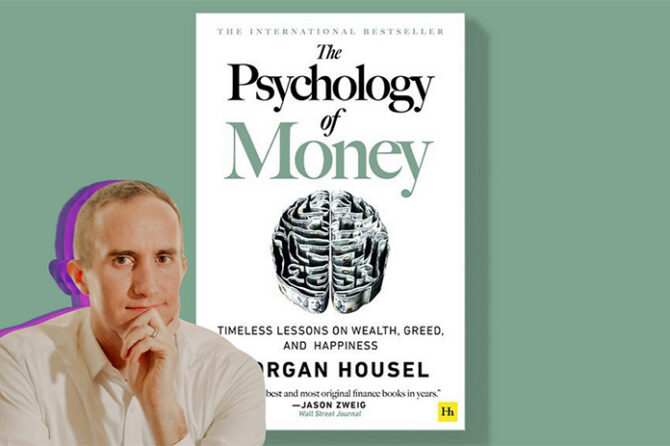
“The Psychology of Money“ isn’t your typical finance book loaded with complex jargon and intricate formulas. Instead, Morgan Housel takes readers on an enlightening journey, exploring how our behaviour, shaped by personal history and emotions, influences our financial decisions. The book is structured into 19 short, engaging stories, each unveiling a different facet of how we perceive, interact with, and manage money.
Morgan Housel, a partner at The Collaborative Fund, stands out in the financial literature arena with his unique approach to discussing money and investment. Not only has he garnered accolades such as the Best in Business Award from the Society of American Business Editors and Writers and the New York Times Sidney Award, but his background also includes being a two-time finalist for the Gerald Loeb Award for Distinguished Business and Financial Journalism. Residing in Seattle with his family, Housel brings his extensive experience and a distinct perspective to his writing, making him a respected voice in the field.
One of the central themes of the book is the distinction between knowing what to do with money and actually doing it. Housel eloquently states, “Doing well with money has a little to do with how smart you are and a lot to do with how you behave.” This sets the tone for the entire book, emphasizing behaviour over pure financial acumen.
Housel also delves into the role of luck and risk, highlighting their often-underestimated impact on financial success. He reminds us, “Not all success is due to hard work, and not all poverty is due to laziness.” This acknowledgment of the doppelgänger effect of luck and risk in finance adds a layer of humility and realism to our understanding of wealth and success.

Another significant aspect discussed is the concept of enough. Housel advises, “The hardest financial skill is getting the goalpost to stop moving.” In a world where consumerism is rampant, this insight into contentment and the dangers of perpetual dissatisfaction is both timely and timeless.
The book also challenges the traditional views on savings, investment, and wealth creation. Housel points out, “Wealth is not about having a lot of money; it’s about having a lot of options.” This perspective shifts the focus from mere accumulation of assets to the freedom and choices that wealth can provide.
Further, Housel emphasizes the power of compounding and the importance of patience in investing. He explains, “The most powerful forces in the world are not earthquakes and tsunamis but compounding returns.” This highlights the significance of a long-term approach to investing and the wonders it can do over time.
While Housel’s book is praised for its simplicity and relatable anecdotes, it may not satisfy those looking for in-depth analyses or ground-breaking financial theories. Critics have pointed out that the ideas, though presented in an easy-to-understand manner, are not particularly novel and often draw from other financial thinkers. Some readers might find the book’s approach too simplistic or its style too reminiscent of popular self-help or motivational literature.
However, this accessibility is also its strength. For those new to financial planning or looking to recalibrate their relationship with money, “The Psychology of Money” offers valuable insights without overwhelming them with technical complexity.

Reading “The Psychology of Money” was a refreshing experience. It’s rare to find a finance book that prioritizes behaviour, mindset, and emotional intelligence over technical expertise. Housel’s writing style is engaging and thought-provoking, making complex ideas accessible to a broader audience.
The book’s emphasis on behaviour and the psychological aspects of financial decision-making resonated with me. It’s a reminder that our relationship with money is deeply personal and influenced by a myriad of factors beyond the numbers on a spreadsheet.
“The Psychology of Money” by Morgan Housel is more than just a finance book; it’s a guide to understanding the human side of money management. It’s a must-read for anyone looking to improve their relationship with money, not through complex strategies, but through a better understanding of their own behaviours and attitudes towards finance. As Housel himself puts it, “The goal…isn’t to make money on the market, but to avoid tricks that let one part of your brain take advantage of the other part.”
Prof. Dr. Prahlada N. B
12 December 2023
Chitradurga.
40 Lessons from ‘The Psychology of Money'”
- Inherent Wealth in Simplicity: Ordinary individuals can attain wealth through behavioural skills unrelated to traditional intelligence. It’s about actions, not academic prowess.
- The Dual Forces of Luck and Effort: Financial success is often influenced by luck, not just intelligence and hard work.
- Behaviour Over Knowledge: In finance, behaviour trumps theoretical knowledge. Real-world financial decisions are more about human behaviour than spreadsheet calculations.
- Emotions in Finance: Unlike exact sciences, finance is steered by human emotions and psychological patterns.
- Experience vs. Knowledge: Understanding financial history is one thing; experiencing its impacts is another. Living through financial cycles imparts lessons that mere knowledge cannot.
- Luck and Risk: Two Sides of a Coin: Both luck and risk influence financial outcomes. Understanding this can lead to better judgment and self-reflection.
- Understanding Success and Failure: Recognize that success is not always a result of hard work, and failure is not always due to laziness.
- The Joy of Time Control: Controlling one’s time is a key contributor to happiness.
- The Moving Goalpost: Financial satisfaction is elusive if ambitions outpace achievements. Knowing your ‘enough’ is crucial.
- Defining ‘Enough’: ‘Enough’ is about balancing financial desires with life’s true values, like family and happiness.
- Warren Buffett’s Secret – Time: Buffett’s wealth is as much a product of his long investment period as his skill.
- Decent Returns Over Time: Long-term investing is about consistent, decent returns, not short-term high gains.
- Earning vs. Keeping Money: Making money is different from keeping it. The latter requires caution and often, inaction.
- Cruise Control and Madness: Like piloting, investing involves long periods of stability punctuated by intense crises.
- The Power of Few: A few key investments can drive wealth, despite other average ones.
- Balancing Wins and Losses: The magnitude of gains in successful investments and minimizing losses in unsuccessful ones shapes future wealth.
- The Dividend of Freedom: True financial freedom is controlling your time and life.
- The Illusion of More: The pursuit of more can lead to dissatisfaction. Recognize your ‘enough.’
- Time Control in Modern Life: Despite advancements, losing control over personal time leads to unhappiness.
- The Illusion of Impressions: Others are less impressed by your possessions than you might think.
- Seeking Respect, Not Riches: People often chase material wealth for respect and admiration, which material possessions seldom bring.
- Wealth is Invisible: Wealth isn’t in the visible luxuries but in unseen savings and investments.
- Rich vs. Wealthy: Wealth is more about saving than earning.
- Modest Wealth, Hidden Riches: True wealth often resides in modest lifestyles, not in ostentatious displays.
- Savings over Income: Building wealth hinges more on savings rate than income or investment returns.
- Reasonableness in Investing: Being reasonable and understanding personal financial behaviour is key to long-term wealth.
- The Limitations of Financial History: Financial history offers general, not specific, lessons for future investments.
- The Unpredictability of the Future: Past financial surprises show the future’s unpredictability.
- Risk in the Unknown: Unprecedented events carry significant financial risks.
- Relevance of Recent History: Recent economic history is often more relevant to current financial decisions.
- Aiming for Realistic Goals: Realistic, lower financial goals can lead to greater satisfaction.
- Adapting Financial Plans: Financial plans should be adaptable, acknowledging life’s changes and uncertainties.
- The Cost of Compounding: Enduring market volatility is necessary for enjoying the benefits of compounding.
- The Trap of Market Timing: Attempting to time the market often leads to missed opportunities.
- Staying Your Course: Stick to your financial game plan and avoid being swayed by others’ strategies.
- The Ephemeral Nature of Extremes: Extreme financial situations rarely last due to market adaptations.
- Compounding vs. Destruction: Growth through compounding is slow but steady, while destruction can be sudden and impactful.
- The Limit of Knowledge: Accept the limitations of our understanding of the financial world.
- The Art of Interpreting History: Financial history interpretation is subjective, influencing different lessons for different people.
- Seeking Sense in Complexity: People create narratives to make sense of complex financial worlds.

















Very nicely summarised into nuggets sir .
ReplyPrahlada Sir ,
Understanding the psychology of money ….
Replywill definitely help one, to develop healthier financial habits & make better investment decisions.